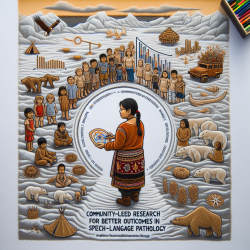Introduction
As speech-language pathologists, our commitment to improving child outcomes is unwavering. Yet, the path to achieving these outcomes is often complex and multifaceted. A recent study, "Niqivut Silalu Asijjipalliajuq: Building a Community-Led Food Sovereignty and Climate Change Research Program in Nunavut, Canada," offers invaluable insights that can be applied to our field. This research emphasizes the power of community-led initiatives and the importance of integrating indigenous knowledge systems into research methodologies. By embracing these principles, we can enhance our practice and ensure that our interventions are culturally relevant and effective.
The Power of Community-Led Research
The research conducted in Nunavut highlights the significance of community-led approaches. This methodology ensures that the research is not only relevant but also beneficial to the community it serves. For speech-language pathologists, this means involving families and communities in the development of intervention strategies. By doing so, we can create programs that are more aligned with the cultural and linguistic needs of the children we serve.
Integrating Indigenous Knowledge
One of the key takeaways from the study is the integration of Inuit knowledge systems. This approach challenges the traditional Western paradigms and emphasizes the value of indigenous methodologies, such as storytelling. In speech-language pathology, incorporating storytelling and other culturally relevant practices can enhance language development and engagement among children. By valuing and utilizing the knowledge that already exists within communities, we can foster a more inclusive and effective therapeutic environment.
Data-Driven Decisions
While the study underscores the importance of community-led research, it also highlights the need for data-driven decisions. As practitioners, we must balance qualitative insights with quantitative data to ensure that our interventions are evidence-based. This dual approach allows us to tailor our strategies to meet the specific needs of each child while maintaining a high standard of care.
Encouraging Further Research
The findings from Nunavut encourage us to explore further research opportunities within our own communities. By collaborating with local organizations and stakeholders, we can develop research programs that address the unique challenges faced by the children we serve. This proactive approach not only enhances our practice but also contributes to the broader field of speech-language pathology.
Conclusion
The insights from the "Niqivut Silalu Asijjipalliajuq" study provide a roadmap for integrating community-led research and indigenous knowledge into our practice. By doing so, we can create more effective and culturally relevant interventions that improve outcomes for children. To read the original research paper, please follow this link: Niqivut Silalu Asijjipalliajuq: Building a Community-Led Food Sovereignty and Climate Change Research Program in Nunavut, Canada.










